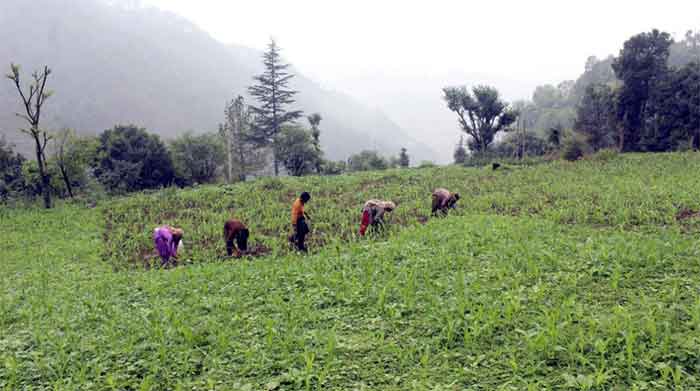
Hilly areas with their varying heights and land categories are known for their valuable bio-diversity which should be protected. The vast Himalayan ranges including hills and valleys, plains and peaks in particular are all the more important in this context.
While the tendency to introduce genetic uniformity of monocultures was unfortunate everywhere, it was all the more harmful in the hilly and Himalayan regions. Some activists and movements like the Beej Bachao Aandolan (Save the Seeds Movement) of Uttarakhand tried to resist this and made efforts for encouraging biodiversity of traditional hill farming . This effort was widely appreciated. Some officials and scientists initially resisted but later realized the value of this effort. After some time the government also appreciated this.
Later some Himalayan states expressed their support for organic and natural farming as being specially suited to the needs for Himalayan region. The Sikkim government in particular was very supportive about it and the Uttarakhand government also expressed some support. In recent times the Himachal Pradesh government has also expressed its commitment to move in the direction of natural farming and claims to have made very significant progress in spreading the Subhash Palekar Natural Farming method in an area of around 5000 hectares or so, which is quite a significant area for hill agriculture.
An important question arises as to how these commitments can be carried forward if these villages do not reduce their dependence on outside seed which is generally of HYV monocultures not suited at all for natural farming , a need recognized also by the beej bachao andolan which collected several hundred traditional varieties of rice and other crops as a base for organic and natural farming.
In this context recent reports that the Himachal Pradesh agriculture department is taking steps to move in the direction of more self-reliance in seeds should be widely welcomed. For example The Indian Express reported on March 12 ( Chandigarh edition) ,–“ As part of a programme to promote natural farming in the state, the agriculture department has identified 12 seed multiplication farms and 130 farmer groups to start developing seed varieties using natural practices.” The aim is to get seeds well adapted for natural farming, not just for the main cereal crops but also for millets and pulses. This effort also involves protection and revival of some endangered local crops.
One hopes that other Himalayan states will make similar efforts so that within a few years farmers who opt for natural and ecologically protective farming can become self-reliant in seeds, which is a very basic step in moving towards ecologically protective farming. In states where such efforts are being made the union government should provide special and unconditional grants under its schemes like Parampragat Krishi Vikas Yojna .
One hopes that such initiatives can spread in Himalayan states to a greater extent so that natural farming spreads here and in addition a strong base for this is created in the form of suitable seeds .
Bharat Dogra is a journalist and author. His recent books include Man Over Machine and Protecting Earth For Children.
GET COUNTERCURRENTS DAILY NEWSLETTER STRAIGHT TO YOUR INBOX
Related posts:
Related posts:
Views: 0
 RSS Feed
RSS Feed

















 March 13th, 2021
March 13th, 2021  Awake Goy
Awake Goy  Posted in
Posted in  Tags:
Tags: 
















